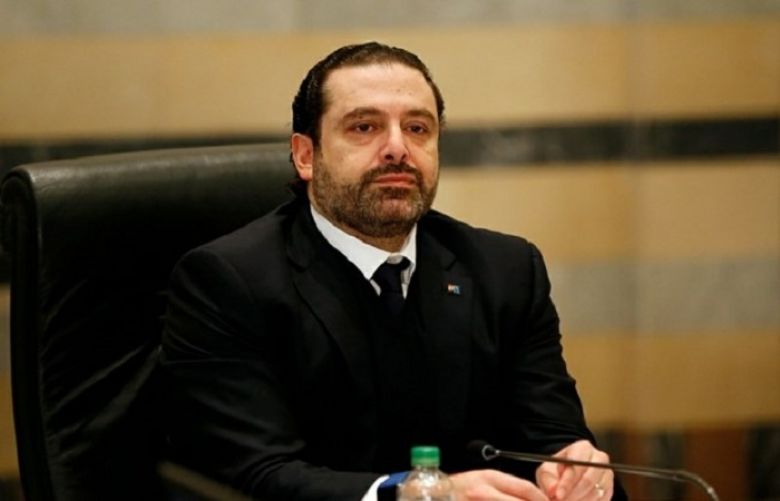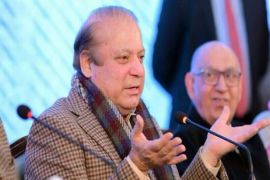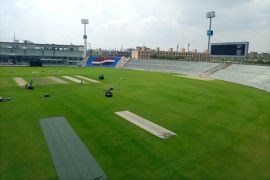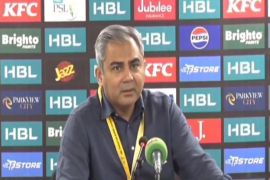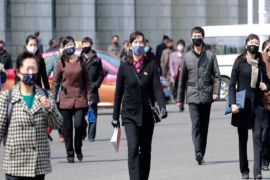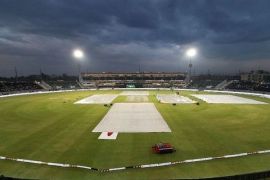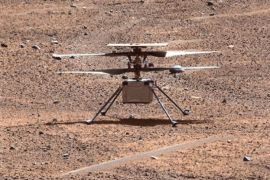Lebanese Prime Minister Saad Hariri has "suspended" his resignation, which sparked a crisis when he announced it while in Saudi Arabia two weeks ago.
Mr Hariri said President Michel Aoun had asked him to "put it on hold ahead of further consultations".
The two men held talks in Beirut a day after Mr Hariri flew back to Lebanon.
Mr Hariri has denied that Saudi Arabia forced him to resign and detained him in an attempt to curb the influence of Iran and its Lebanese proxy Hezbollah.
Hezbollah is part of a national unity government formed by Mr Hariri last year.
"Today I presented my resignation to his excellency the president, and he asked me to temporarily suspend submitting it and to put it on hold ahead of further consultations on the reasons for it," Mr Hariri said in a speech after Wednesday's meeting at the Baabda presidential palace.
"I expressed my agreement to this request, in the hope that it will form a serious basis for a responsible dialogue," he added.
Earlier, Mr Hariri was embraced by Mr Aoun as the two men attended an independence day military parade in Beirut. The president, a Maronite Christian former army commander and ally of Hezbollah who publicly accused Saudi Arabia of detaining the prime minister, appeared to tell him: "Welcome back!"
Mr Hariri left Riyadh for France at the weekend. He travelled back to Lebanon on Tuesday, stopping in Egypt and Cyprus on the way.
The BBC's Martin Patience in Beirut says there is now likely to be days of backroom dealing in order to resolve this political crisis.
Significantly, our correspondent adds, in a previous televised address Mr Hariri opened the possibility that he might stay in power. But he stated that Hezbollah would have to respect Lebanon's policy of staying out of regional conflicts.
The militant Shia Islamist movement is fighting alongside government forces in Syria - where Saudi Arabia supports the opposition. But it denies helping rebel forces in Yemen's civil war, where a Saudi-led coalition backs the government.
On Monday, Hezbollah leader Hassan Nasrallah said he still considered Mr Hariri prime minister and that he was "open to any dialogue and any discussing that happens" in Lebanon.
He also accused Saudi Arabia of destabilising Lebanon and collaborating with Israel in an attempt to start another war in Lebanon.
Mr Hariri announced his resignation in a televised address on 4 November from Riyadh, in which he accused Iran of sowing "discord, devastation and destruction" in the region and said he sensed there was an assassination plot against him.
His father Rafik - himself a former prime minister - was killed in a suicide bombing in Beirut in 2005. Several members of Hezbollah are being tried in absentia at a UN-backed tribunal in connection with the attack, though it denies any involvement.
Mr Hariri, a Sunni Muslim who became prime minister for the second time in late 2016 in a political compromise deal that also saw Mr Aoun elected president, has close ties to Saudi Arabia.
He holds both Lebanese and Saudi citizenship and has extensive business interests there. Riyadh also backs his political party, the Future Movement.

